acme smoked fish co. 2022 sustainability report


acme smoked fish co. 2022 sustainability report

Based in Brooklyn, New York, Acme Smoked Fish Corporation is a fourth-generation, familyowned seafood company. Since our beginnings in the early 1900s, Acme has been committed to providing the highest quality seafood specialties in an expanding number of varieties.
While the company has grown significantly, with additional locations in Massachusetts, North Carolina, Florida, Chile, and Denmark, we are still deeply connected to our Brooklyn roots. It’s home to us. However you are able to enjoy our products—from supermarkets and specialty stores, to bagel shops and breakfast tables—we hope you feel a part of our community for passionate lovers of great food.
For over 100 years, our traditions have marked our past, inspire our present, and will continue to shape our future. We recognize the importance of our methods in the products we make, the techniques we use, and the effect that it has on our evolving culture. While innovation and progress are important, tradition is what unites Acme Smoked Fish.
We hope the Acme legacy becomes part of your family traditions as well.
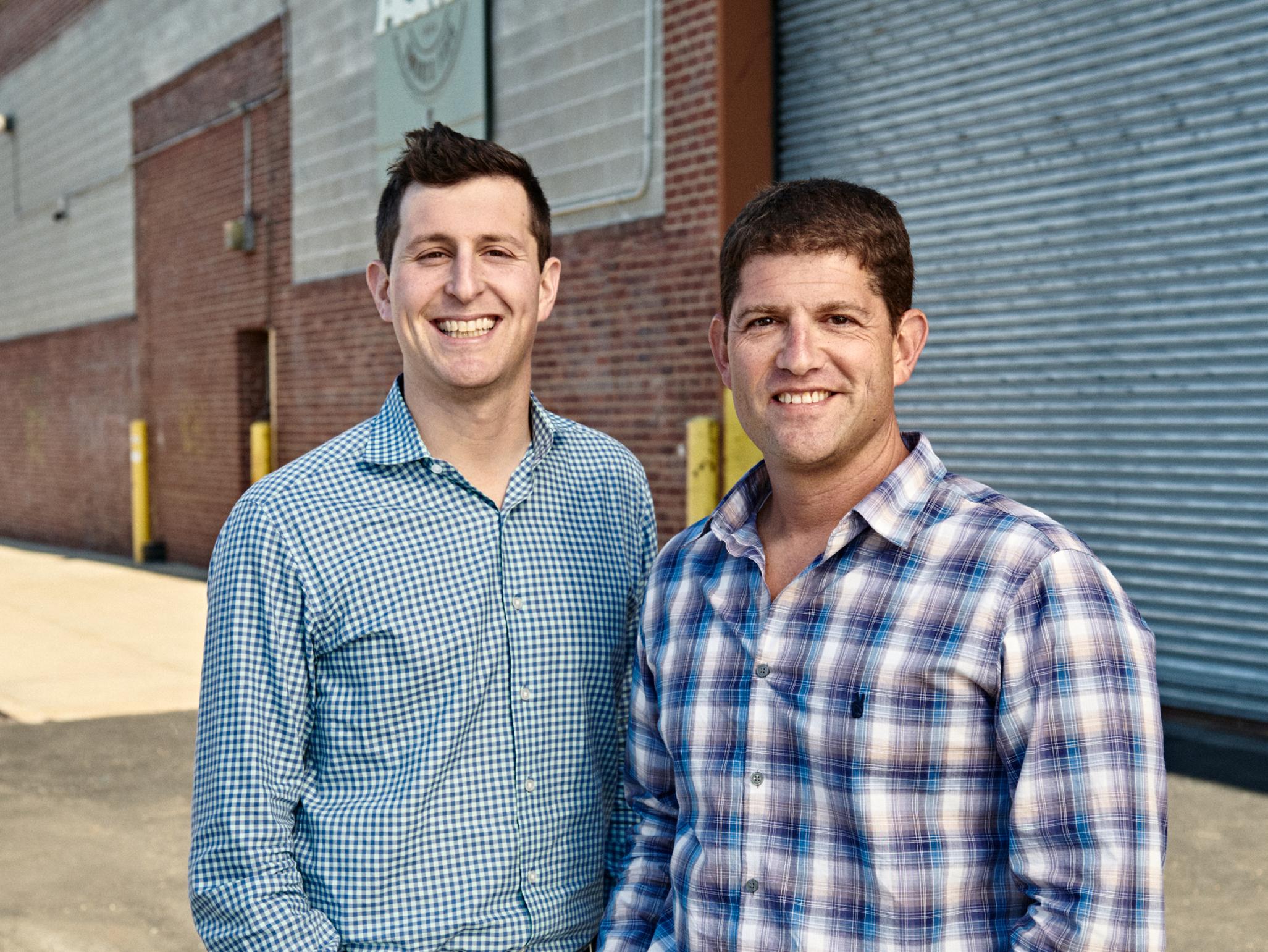 ADAM AND DAVID CASLOW IN FRONT OF THE BROOKLYN HQ FACILITY
ADAM AND DAVID CASLOW IN FRONT OF THE BROOKLYN HQ FACILITY
TWO YEARS AGO, we took our first steps on a journey to become a more sustainable business. What started out as an interest in improving Acme’s practices and operations has turned into a fierce commitment to act as Citizens of Seafood – to not just adopt a few responsible processes here and there, but to truly make sustainability a core value of who we are as a business and as a team.
We are aware that this is not a quick or easy process, and it is a major undertaking to do it right. But we believe doing right by our planet, people and communities is imperative to the success and viability of our business in a world where the environmental and social stakes are higher than ever.
We want Acme to become a leader within the seafood industry by sourcing and selling environmentally responsible fish. We’re doing this by acting with intent to reduce waste, saving resources across our supply chain, encouraging fisheries and farms to improve their practices, and supporting our people as critical partners.
In 2022, we charted a detailed course to understand our options and define our opportunities for real impact. We’ve set comprehensive targets for both the immediate and long term and refined our focus areas to ensure we can deliver on our promises. In short, we’ve put ourselves in position to act.
This year is about turning our aspirations into meaningful, concrete outcomes. Work has started to streamline our packaging and find alternative uses for fish scraps and food waste, to open doors for employees and their families with college scholarships, to offset our electricity consumption at our facilities through solar power and efficient refrigeration, and to fund industry innovation that can benefit underserved groups.
As a family-owned business that has prided itself on bringing people together through food for four generations, Acme is deeply invested in making sure families and friends can enjoy great quality seafood around their tables for generations to come. We can only do that if there are healthy fish in our waters, responsible practices in our industry, and a community willing to join together to protect our natural resources.
On behalf of the entire Acme team, we are eager to enter this new chapter of action and to deliver on our commitments as Citizens of Seafood.
ADAM CASLOW, CO-CEO DAVID CASLOW, CO-CEO EDUARDO CARBAJOSA , PRESIDENTTHE PAST YEAR was one of the most challenging on record for the seafood industry. We saw raw material prices spike to all-time highs, and supply chain challenges that began during the pandemic persist. Despite these difficulties, we remained committed to pushing our sustainability work forward.
At Acme, being a Citizen of Seafood means that we strive to do right by our people, our communities, and our planet by putting social responsibility and sustainability at the center of our decisions. This is a core value of our company. We are so committed to it that we are educating our entire workforce about what it means and how each and every employee can contribute.
The key to building a culture that supports this value is to have a clear benchmark of data that explains where we are starting, so that we’re able to celebrate when people take actions—no matter how small—that help us improve. This was what 2022 was all about: developing baseline information in the U.S. and in Chile so that we can start to set targets to address the company’s largest impacts.
In this year’s report, you will read about efforts to increase the amount of eco-certified raw materials in our products. You’ll hear from Acme team members on what we’ve learned about our carbon footprint, new approaches to packaging, and managing our waste. You will also have a chance to read about the initial impact of the newly formed Acme Smoked Fish Foundation, both within our company and the communities where we work.
We’ve made positive progress in year two of our Citizens of Seafood journey while clarifying our path forward. In 2022, we looked at our six facilities individually; 2023 will be about taking a global look at our impacts so that we can develop unified targets across Acme.
As was the case last year, this report is also about highlighting the people doing the work. We have a great team, and Acme’s sustainability efforts would not be possible without their passion and commitment. •
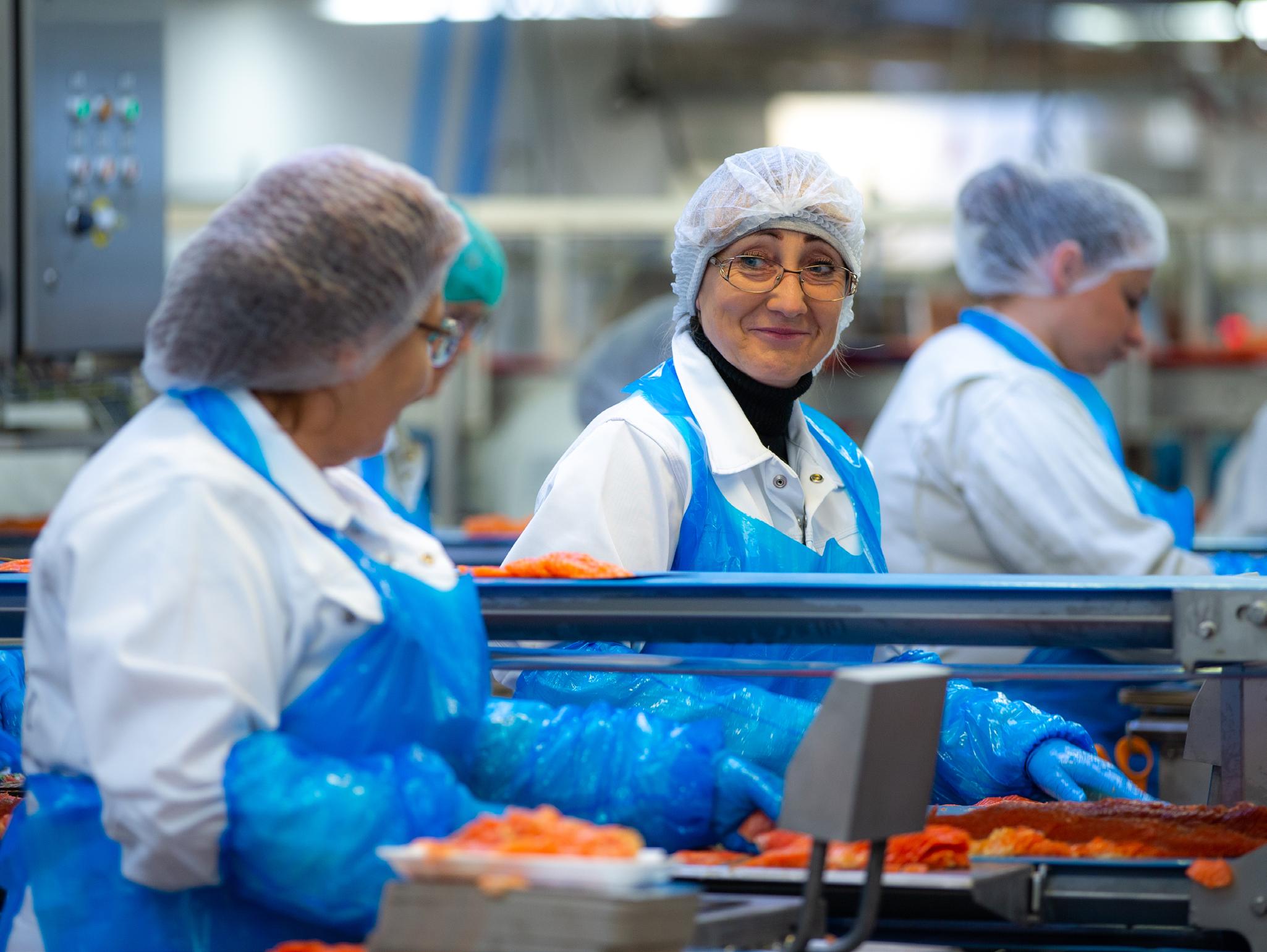 ACME EMPLOYEES IN THE SLICING ROOM
ACME EMPLOYEES IN THE SLICING ROOM
We continue to align our sustainability efforts with the UN Sustainable Development Goals. This comprehensive set of goals address the most important impacts that are shaping the future of our planet and humankind. By setting targets that align with the USSDGs, we are contributing to global actions that will support a world that can thrive for generations to come.

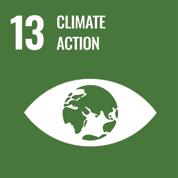


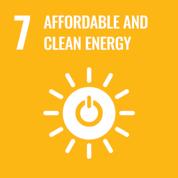

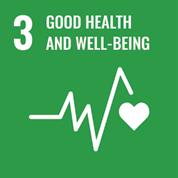
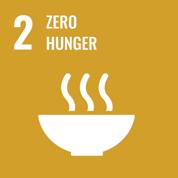


four pillars of sustainability
Contributing to the long-term health of ocean and lake ecosystems.
Creating a healthier environment for all.
Addressing the climate crisis.
Supporting our teammates, their families and the communities where we work.
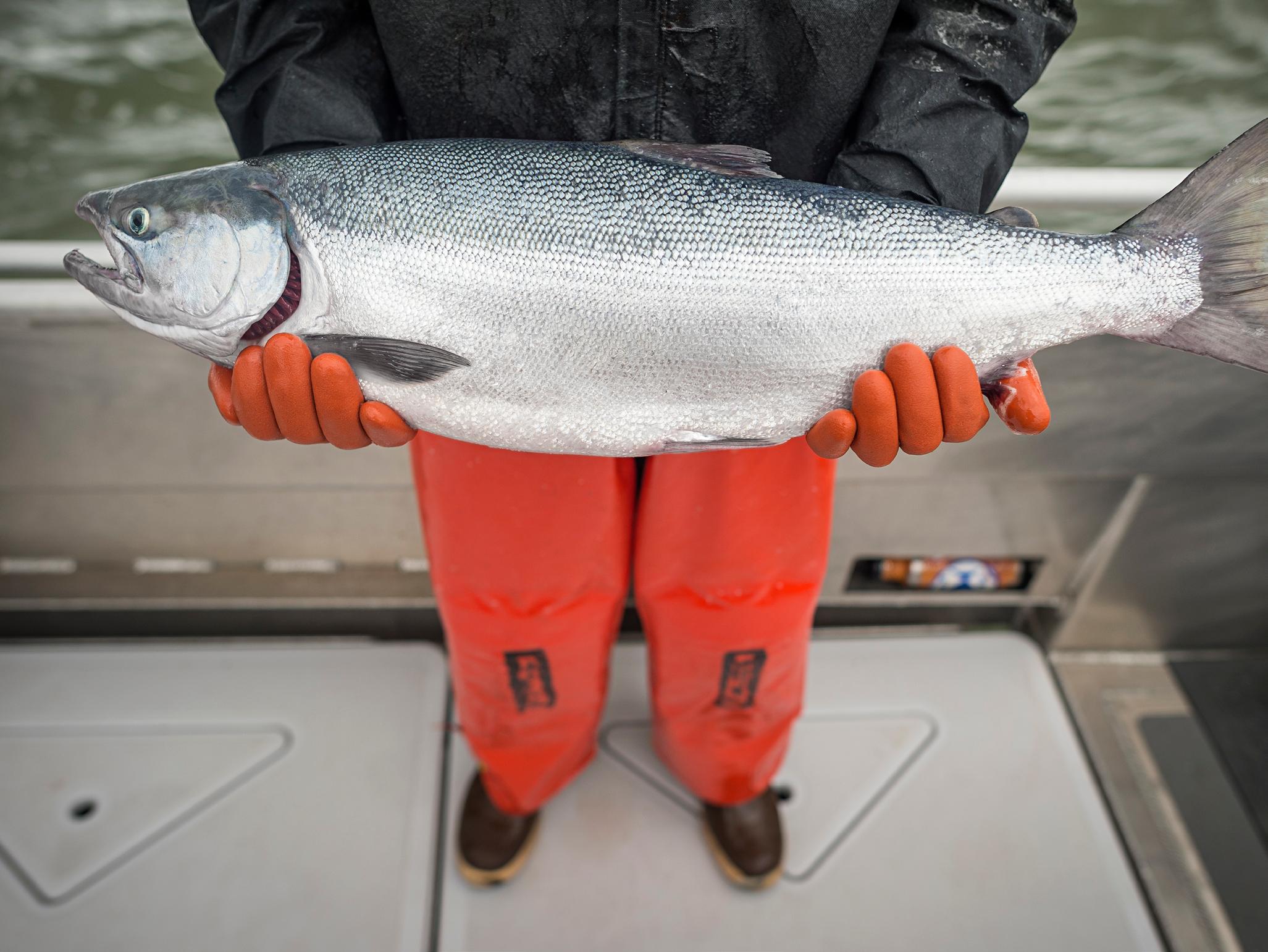
Sourcing the best fish for smoking isn’t easy, and we are aware of the impact that our demand for fish has on marine ecosystems. It is a constant cooperative effort between Acme and our valued partners to be conscientious stewards of our environment.
Acme is proud to report that 98% of all the salmon that we source is certified under one of the eco-certifications recognized in the GSSI (Global Sustainable Seafood Initiative) benchmark: Best Aquaculture Practices (BAP), Aquaculture Stewardship Council (ASC), Marine Stewardship Council (MSC), and GlobalG.A.P. Other key species we source, such as whiting and mahi mahi, are participating in Fisheries Improvement Projects. And, as a large purchaser of lake whitefish, we continue to work with the Canadian government, harvesters, and suppliers to make progress on the science that underpins the management of that species. In addition, we continue to bring greater transparency to our seafood supply chain through the use of blockchain technology, from boat or farm to plate.
When it comes to sustainable aquaculture, we rely on eco-certification bodies to look at much more than the environmental impacts of fish farming at the farm site. These certifiers also trace each ingredient in the fish feed back to the source to ensure it is produced sustainably, examine the labor practices at fish farms and, in the near future, will measure the impact of fishing activities on climate change.
Acme is dedicated to leading by example as eco-certification and traceability become the new standards across the industry—because we know that this is the right decision for our business and for the planet.
alaskan salmon
whitefish
herring
wild caught
farmed
atlantic salmon
whiting
 atlantic salmon
atlantic salmon
Acme employs Trace Register so that our customers can be certain about where their fish comes from. For more than 15 years, Trace Register has been the leader in traceability software for the global seafood industry, helping every member of the seafood supply chain ecosystem. In 2022, we chose to upgrade to Trace Register 5, a platform for full-chain seafood traceability that is aligned with the new worldwide standards set by Global Dialogue on Seafood Traceability (GDST). This transition will be fully implemented by 2023.

FRANCO ADAM HAS DONE CONSIDERABLE WORK to align the cultures of Acme Smoked Fish and Acme Chile over the past several years. He has worked closely with the Caslow family to figure out the best way to run Acme as a global company and bring the teams closer together in spite of the geographical distance between Brooklyn, New York and Puerto Montt, Chile.

Franco studied aquacultural engineering in college and after graduation, joined the booming Chilean salmon farming industry as the commercial director for AquaChile, the largest aquaculture operation at the time by sales. It was during this time when he met David Caslow, and after a 12 year customer-supplier relationship, they negotiated the creation of Acme Chile in 2015, a joint-venture to procure and process salmon for the creation of smoked fish products.
“Acme was one of my oldest and probably most important customers during my time at AquaChile, so it was an easy transition because we had knowledge of the company from day one.” Franco said. “It was a part of the vision of the Caslow family this being the first flag they put in the ground outside of the U.S. And they recognized that they cannot run a company 10,000 kilometers away in a different culture.”
For improving sustainability outcomes, Acme Chile has a set of initiatives specific to their operation that align with Acme’s global goals. But when Citizens of Seafood was launched as both a report and a company ethos, the team in Chile needed to modify the value into something more easily translatable: Somos ciudadanos responsables – we are responsible citizens.
“Somos ciudadanos responsables –we are responsible citizens.”
Acme Chile also approached their participation in the Acme Education Fund last year a bit differently. Instead of awarding scholarships—as was the case in the U.S.—Franco and his team realized that there were infrastructure needs in their community and allocated $10,000 to the construction of a new soccer field and playground at a rural school near the plant in Puerto Montt. A few months later, the students became honorary members of the Acme family: they were invited to the plant for a tour at Christmas, gifted sneakers, and encouraged to consider a career at Acme in their future.
aquaculture is a sustainable and essential solution to feeding a ballooning global population. And he sees sustainability as much more than simply checking a box to fulfill a corporate promise.
“It’s taken everyone in the industry years to understand that sustainability is much deeper and is connected with all the resources and people and a whole way of being,” Franco said. “These are the first bricks of a huge building that we’ll continue to build for another 20 years and beyond.” •
“The impact with the kids was huge,” Franco said, “and felt in keeping with our culture of giving.”
Today, Acme Chile produces nearly 85% of the salmon used in Acme’s products. Franco believes that
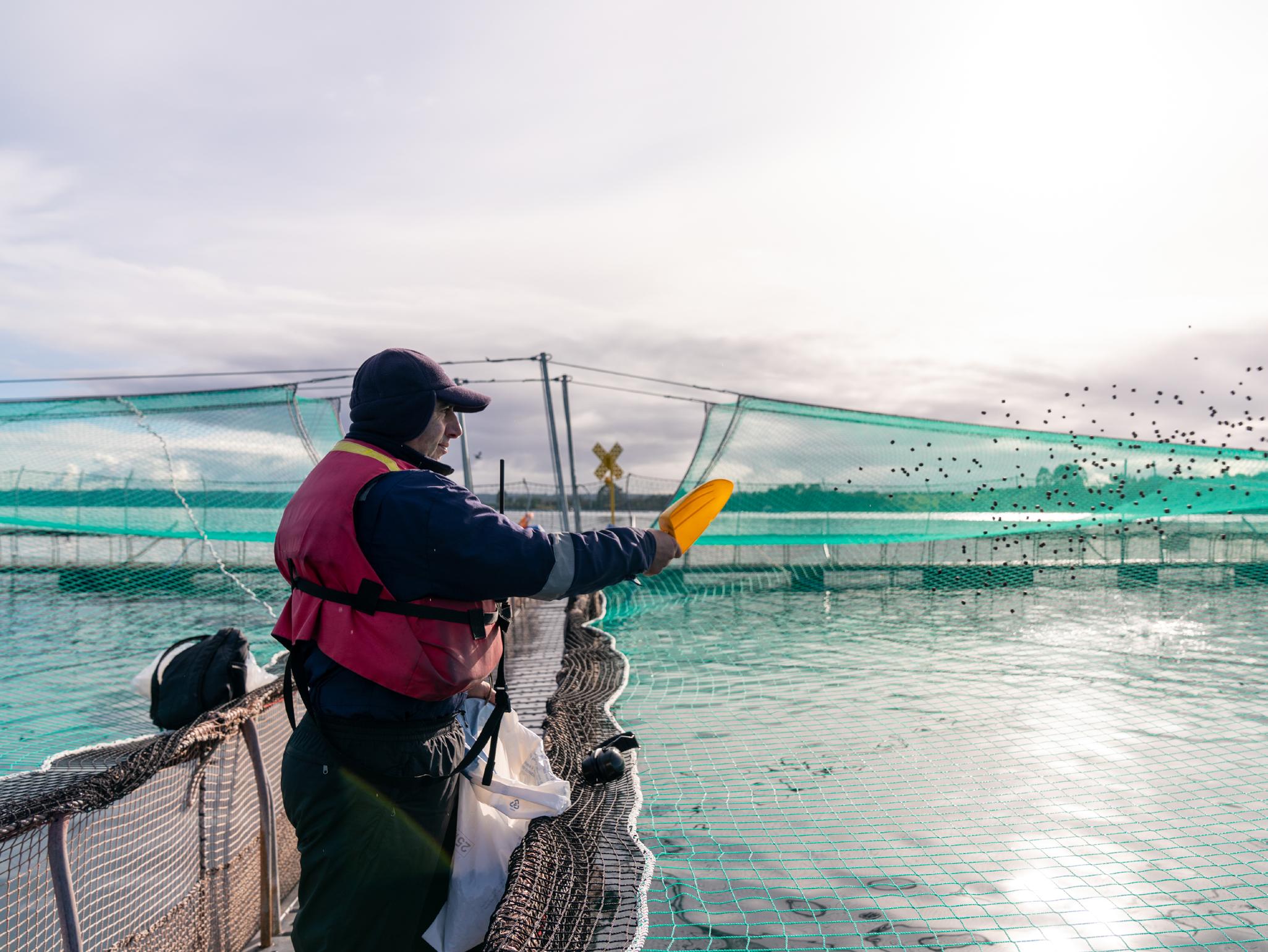
 MILES WEINRIB, CUSTOMER OPERATIONS SPECIALIST, HANDS OFF A FISH FRIDAY ORDER IN BROOKLYN
MILES WEINRIB, CUSTOMER OPERATIONS SPECIALIST, HANDS OFF A FISH FRIDAY ORDER IN BROOKLYN
CRAIG MARKMAN: At the beginning of my career, there was no regulation or thought of sustainability. No one really knew the answer to why fish stocks were going up and down. Fish were always abundant and valuable and you were able to, at that point, choose based on quality without thinking of availability and price. Whereas today, we’re much more driven by the totality of the industry and what it means to everyone—from the fishermen to the processors— and the toll on the environment and people and evaluating what the value truly is.
TAMAR MENDELSOHN: While I might not originally be from New York City, smoked salmon and myself have always had a very close relationship. I grew up in London and my community there certainly enjoyed a bagel and schmear and some smoked salmon on a Sunday. However, because of my job and the company I work for, I have greater awareness and education on the sustainability policies we adhere to, as well as the ones for supermarkets and restaurants. When I started at Acme five years ago, my job was twofold. It was a traditional
sales role as well as providing all of our customers with a plethora of information that they require. And since the demand for more information has increased over time, that has become my whole role, as well as assisting with the sales team. So the complexity is ensuring that we know exactly how our farms and fisheries work, their own policies, and providing supermarkets and other customers with that information. And it really has evolved where once it was more broad and vague.
PHILIP GADSDEN: Before Acme, I was working for one of the big supermarket chains for 38 years as the director of meat and seafood. And in the early 2000s, as an organization, we began to look at the multifaceted approach to sustainability, whether it was energy, packaging, or the lifecycle of a facility. We were building our programs to make sure that we were developing a standard for procurement that meets the long-term needs for sustainability.
MARK ROSS: I handle a lot of our big supermarkets and those are the places where we’re getting a lot of the pressure to perform on sustainability as a company. All of these sustainability programs are dictated by the retailers and each one operates with a separate NGO and has different requirements. When I bring a new requirement to Acme, it creates huge conversations throughout the operations in the company.
CM: About four years ago, we had a meeting in Boston where we began to conjure up what a true Acme sustainability program would look like. And we started making some very slight inroads, mostly pertaining to raw material purchasing. There was a thought driving the seafood world at that point which was: how could we be better members of our community and position Acme to do the right thing in protecting resources and ensuring the long-term survivability of a seafood company in the world. And then lo and behold, Rob Snyder came along
and really turned the apple cart upside down and made us evaluate who we are in so many different ways and how we could start to put together the concept of a true sustainability program. He put the stake in the ground and we started to grow. Together, we put little seeds in the ground and we have a little plant today.
MR: It’s long overdue to know where these products are coming from. Does it translate to the consumer?
I hope so. The consumer hopes that the products adhere to the sustainability programs in place and they’re buying sustainable seafood.
TM: I think it’s very apparent to everyone who works within this industry, and the food industry as a whole, that consumers are only becoming more and more interested and purposeful over time in their purchasing decisions so that they know what they’re eating, where it’s coming from, and the brands themselves. Are they ones that are socially
responsible? Do they have sustainability policies that they agree with? Because of that, our customers are spending a lot of budget, time, and effort on their sustainability policies. And they really want to work with vendors who are on the same page. So it’s become not just a commitment but a passion for Acme to work together with the supermarkets to really give the consumers what they want.
MR: We’re trying to create a program that first and foremost meets Acme’s profitability requirements, but also the retailers. When I came to work for Acme, I told everyone that I work 50% for Acme and 50% for the retailer. If the retailers aren’t successful, Acme isn’t going to be successful, right? That’s a hard concept for everybody to swallow, but that’s the reality. So all these partners that I work with, I’m their employee too and trying to make their category successful. And we’re doing that now by consolidating all the requirements.
CM: I think all the sustainability efforts are rooted in doing the right thing. Our role in sales is slightly more convoluted because we reach such a broad base of customers and they all have engaged with different groups that are trying to do the right thing, but have different methods to get there. So in trying to understand and work within their guidelines, it’s a little more difficult for us. But they are challenges we’re willing to take to continue our relationship with some of these incredible companies that keep growing and keep putting demands on us. We’ve seen the value of these different organizations and these rating agencies and we can gain information and strength from all of them. Even though it’s a little harder, I think we’re willing to put the work in.
PG: It feels like we’ve really begun the journey with sustainability. I wholeheartedly believe that traceability is number one, and then being able to benchmark yourself, year over year, and how you’re progressing with delivering on what you say you’re going to deliver on.
TM: One of the things that I’ve noticed is that this is not just a conversation within our industry or just in the U.S., but it’s really global. I’m excited to see where it goes because this global network is quite fascinating. You have the fisheries and the people who work for the seafood companies, and everyone’s coming together as part of this conversation, to change the narrative and to really be proactive in their approach to sustainability.
CM: Everyone can help. It doesn’t have to be just the fish buyer to be sustainable. You don’t have to be the owner or the freight logistics person. You don’t have to be anyone specific. Just make good choices every day to live in a more sustainable way within the Acme culture, both humanistically and physically. And I think those are going to take us to a much better place, as a company that can practice what they preach and has started to educate and give people the understanding that they can make a difference. It’s what we live, right? You know, it’s easy. •
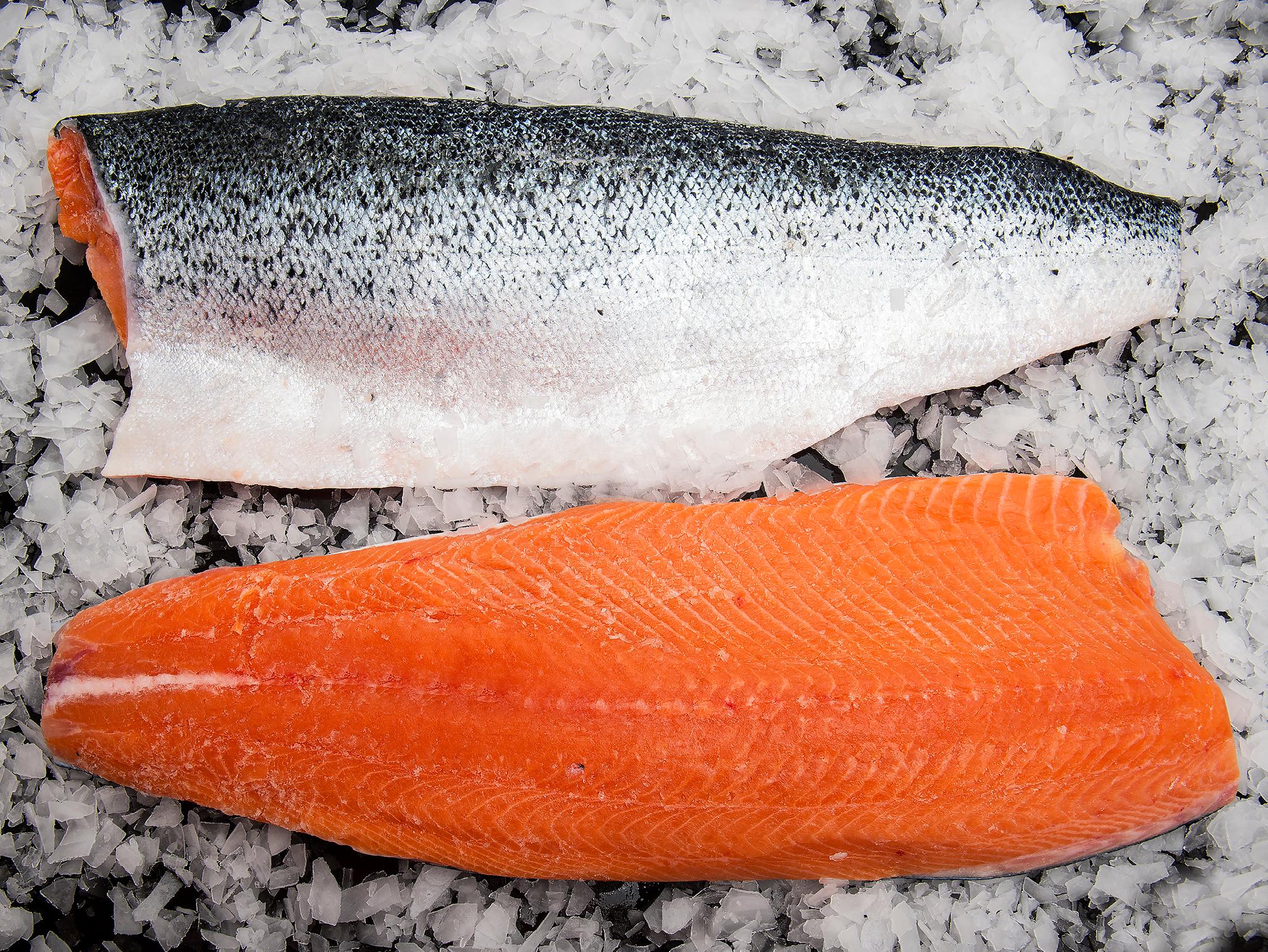
HELPING TO SUSTAIN FISHERIES IS IN JACOB TUPPER’S DNA
WHEN JACOB TUPPER FIRST VISITED THE GREAT LAKES in 2016, he began to fully understand and appreciate underutilized fish species—what they are, their value, and how they fit into the big picture of the seafood industry.
JACOB TUPPER SALES MANAGER AND SUSTAINABILITY ADVISORHe was working as a purchaser for Sea to Table and after visiting with commercial fishing families in Michigan, he traveled to Manitowoc, Wisconsin and first saw a lake whitefish operation. The place was old school, a thirdgeneration smokehouse that smoked right on site.
“I went out at four a.m. and pulled trap nets with these guys and saw how they actually caught the fish and then we went back and drank beer and ate fried fish at 10 a.m. at the dock,” Jacob said. “Understanding the culture surrounding fish is a big part of it for me.”

Jacob has been part of the fishing world all his life. His parents were heavily involved in the seafood industry starting in the 1970s, both cutting their teeth in Alaska: his father worked on a catcher-processor boat and his mother worked in canneries before going into sales and food science, respectively. Jacob remembers visiting the plants and offices where his parents worked when he was a kid, always surrounded by fish and “fish people”. And because his family was so connected to it, he quickly discovered one of the earliest economic opportunities available to him was in the industry.
“One of the first seafood jobs that I got paid for was when I was 11 or 12,” Jacob said. “My mom had agreed to help the company put labels on countless cans of fish and she hired my sister and I. We spent part of Christmas
break surrounded by hundreds and hundreds of labels. Seafood was really present a lot of the time growing up.”
By the time he was 17, Jacob’s parents bought a company that represented a dozen boats out of Southeast Alaska. Five days after graduating from high school, he traveled from his home in the Seattle area to Naknek, AK to work at a cannery’s QA department during the Bristol Bay sockeye salmon run, half a summer of insane 100-hour weeks. Upon finishing his degree at Tulane University in 2012, he spent two summers on a commercial vessel, catching king and coho salmon. Even though he grew up around seafood, these experiences made everything click in his mind—how the resources, the economy and the communities are all connected around fisheries.
“We get so separated from our food, yet it’s important to tell the story of where these fish are from and who’s involved in getting them to our tables.”
 F/V SHAELYN PULLS A GILLNET OF LAKE WHITEFISH IN LAKE WINNIPEG
F/V SHAELYN PULLS A GILLNET OF LAKE WHITEFISH IN LAKE WINNIPEG
Jacob moved to New York City in 2014, trying to get out of working in seafood, but it only lasted six months. He tried his hand working with tech start-ups but soon found himself involved in purchasing for one seafood company, then managing a wholesale fish account for another. The latter job had him selling fish primarily to fine dining restaurants focusing on underutilized species.
By the time he joined Acme in a sales role in 2018, he had plenty of experience getting people excited about less popular (but still delicious) species of fish.
In last year’s Citizens of Seafood report, Jacob described the slow but promising developments in Lake Winnipeg whitefish fisheries management. Now he’s tracking the nascent lake whitefish aquaculture industry in

Ontario and working with other team members on creating a standardized label for whitefish products to indicate where the fish was caught, the catch method, date of harvest—all the information that will allow them to bring lake whitefish into Acme’s traceability system.
“I think sustainability is in part about creating a connection to the source - in this case, our fisheries,” Jacob said. “We get so separated from our food, yet it’s important to tell the story of where these fish are from and who’s involved in getting them to our tables. Even if the sustainability effort for lake whitefish is in an imperfect state right now, our involvement shows that we at Acme care about the progress, we’re engaging with communities, and have something to say about it.” •
Acme joined the Global Sustainable Seafood Initiative (GSSI) in 2021 in order to navigate complex eco-certification guidelines in the seafood industry. GSSI is dedicated to shaping the future of sustainable seafood through public-private partnerships that include 90+ organizations across the sector.
In 2022, GSSI launched Seafood MAP, a globally inclusive digital platform to compile and accelerate fishery and aquaculture efforts towards sustainability. It promotes collective action in the sector by aligning producers, investors, governmental bodies, NGOs, and communities with a common language for transparency and connectivity. Acme is proud to be a Seafood MAP Task Force member and is committed to supporting a more sustainable seafood industry around the world .
To learn more about GSSI and Seafood MAP, click here.
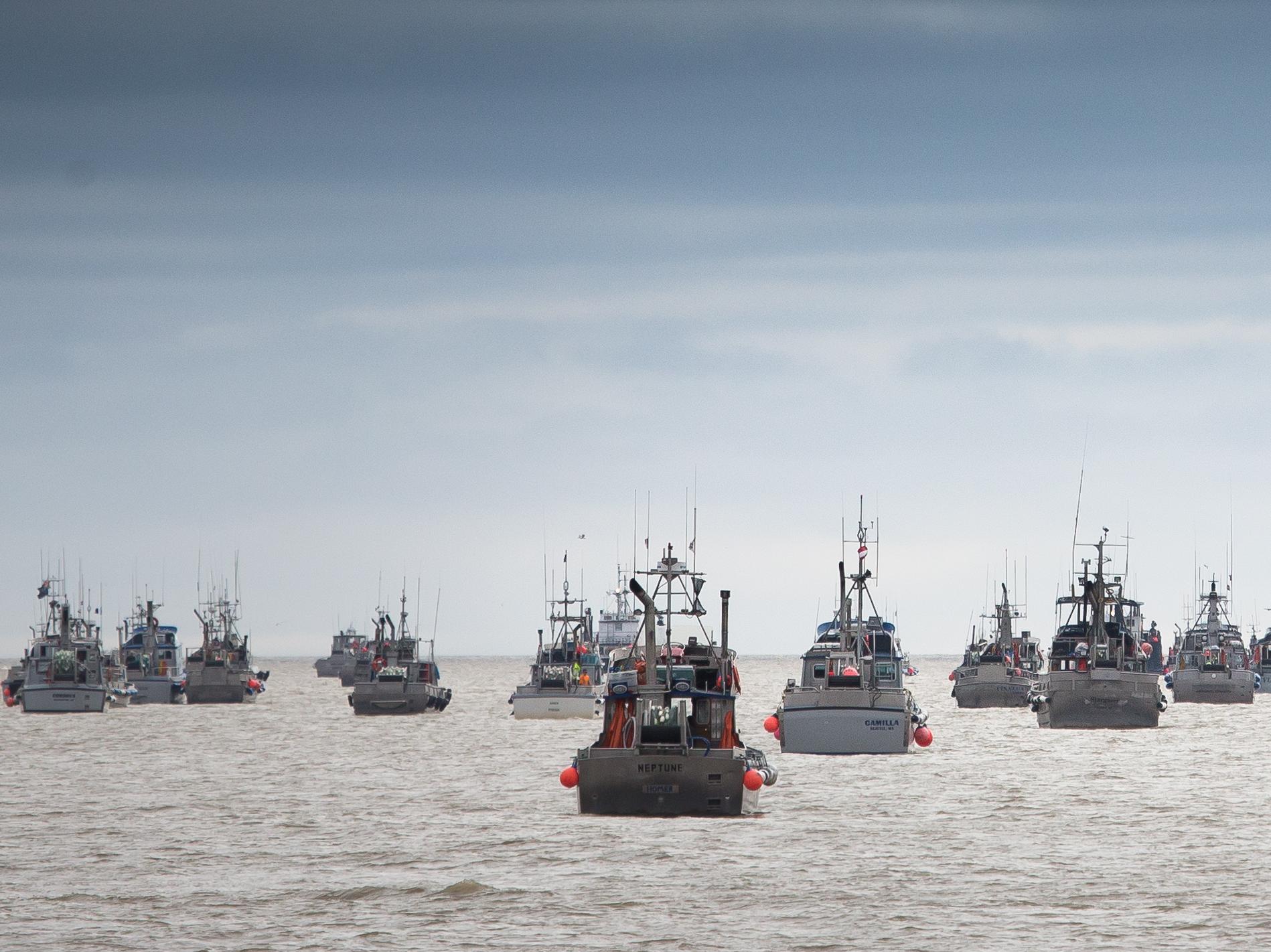
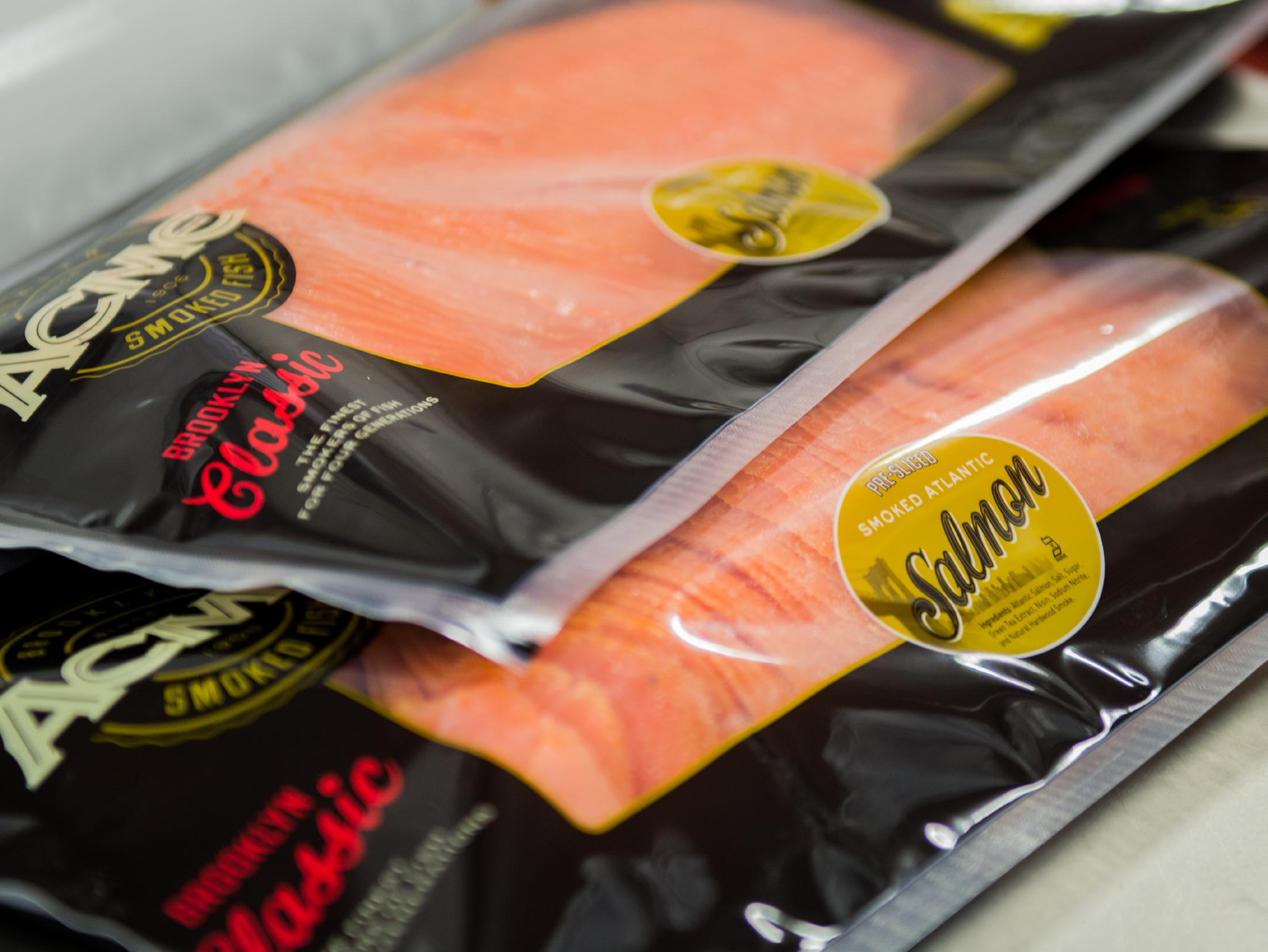
Our progress on waste reduction in 2022 can be defined by several pilot projects that we’ve taken on. Over the course of the year, we assessed the total makeup of our consumer retail packaging. We identified a few wins through redesigning boxes and other packing material, and rethinking how we fill them before they are shipped to our customers.
We were able to establish a baseline understanding of our overall consumer packaging footprint, and set goals for 2023 related to reducing the amount of packaging, and increasing the recyclable content in our packaging.
One area where we need to make future improvements is the overall waste we are producing across our global footprint. We will be using the year ahead to gather the baseline of our overall waste—in the U.S., Chile, and Denmark—to help us determine how best to make progress.
Our vision of Acme’s packaging improvements is aligned with the UN Sustainable Development Goals to minimize waste, increase recyclable content, and decrease overall packaging usage. We aim to provide sustainable packaging to our customers and consumers without compromising food safety, product quality, and sales. One way we’re approaching that is by adhering to a circular economy, which helps keep materials, products, and services in circulation for as long as possible. It uses a systems-focused approach and involves industrial processes and economic activities that are restorative or regenerative by design, enables resources used in such processes and activities to maintain their highest value for as long as possible, and aims for the elimination of waste through the superior design of materials, products, and systems (including business models). It is a change to the model in which resources are harvested, made into products, and then become waste. A circular economy reduces material use, redesigns materials, products, and services to be less resource intensive, and recaptures “waste” as a resource to manufacture new materials and products.
• Analyzed NY and NC packaging by material and weight (2021 baseline)
PACKAGING REDUCTION
• Removed extra headspace from corrugated boxes
• Refining optimal new structure of packaging with film gauge reduction
CIRCULAR ECONOMY
• Evaluated flexible plastic recyclability criteria from the APR PE Film Design Guideline
• Investigated Recyclability claims with How2Recycle
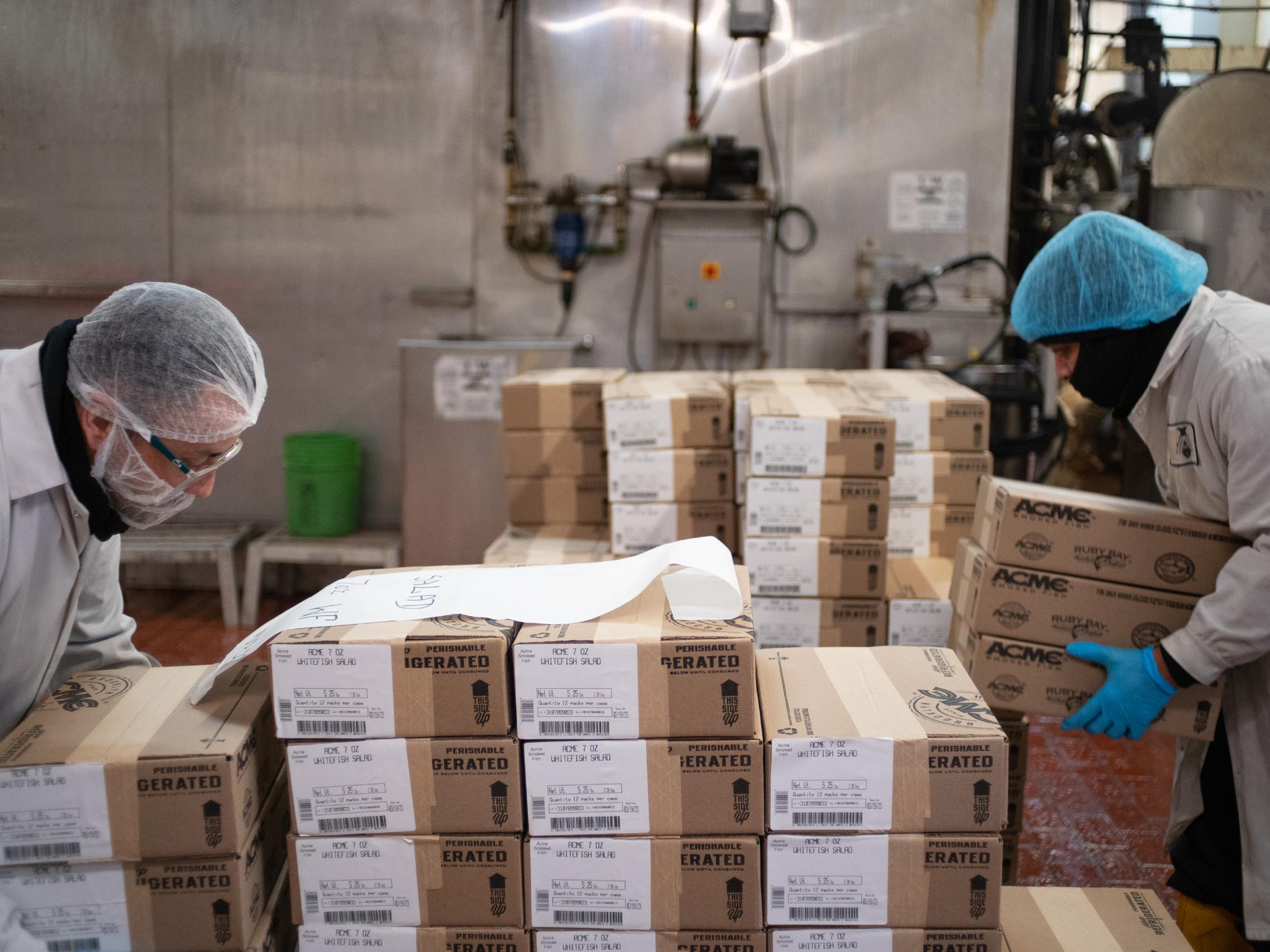
BEN SCHWARTZ HAS GROWN the supply chain team at Acme over the past 10 years, and is passionate about packaging innovation. While navigating the often competing demands of food safety regulations and sustainable packaging opportunities, Ben and his team have worked closely with Acme’s suppliers to achieve some tangible wins.

By reducing the thickness of plastic used on vacuum-sealed products—a process called “downgauging”—by 20%, Acme has already saved 28 tons of plastic.
By removing excess packaging from a customer’s boxes, Acme saved 20,000 pounds of corrugated cardboard.
But Ben is not stopping there. His end goal? Creating a circular economy for Acme’s packaging by 2030.
“Nature, for the most part, doesn’t leave any waste behind,” Ben said. “It reuses everything that it generates, and we want to be in that same boat— we need to somehow figure out a way for everything to be repurposed and get a new chance at life.” •
I MAJORED IN FOOD SCIENCE decades ago but my entire career has been in product development. And there’s nothing more exciting than working on a new product and seeing it on the shelf or seeing someone pick it up in the store. You almost want to say to them, oh, that’s my product! There’s a lot of pride in it.

When I first joined Acme three years ago, I was challenged with how we utilize our byproducts, especially for cold smoked salmon. We trim the products and get rid of what we call the dark meat. So there’s waste that right now goes to the landfills and we pay to get rid of it, at about 20 to 25 cents a pound. That’s one waste stream. The other is the salmon skin and we pretty much throw a majority of that out. We have some ingredient and pet suppliers that can use those streams, but they are largely underutilized.
I think what’s really cool is that there’s been an interest throughout the food industry over the last few years in developing new products from what they call “upcycled foods,” a good example of that being bruised fruit that typically would
be thrown out. We’ve seen in the market recently that there’s companies that have taken salmon skins and made them into salmon snacks, and they’re really touting the fact that they’re taking advantage of ingredients that often end up in landfills, incinerators or animal feed. And what’s exciting is that consumers are seeing upcycled food more and more as an advantage, as opposed to feeling like they’re buying something that should be going into the garbage. They see it as, wow, this is better for the environment.
For Acme, there are lots of opportunities for us to take our recycled ingredients, like our salmon trim, and turn it into something totally new. Right now we sell a lot of the trimmings, which are the off-cuts in small pieces and it’s actually great salmon. We’ll sell them to our large supermarket customers as is but we could possibly utilize the gray trim and sell it as an ingredient for recipes. When I first started looking into how to deal with our byproducts, I thought it’d be really cool if we could extract the omega-3 fatty acids from the fish and sell them to pharmaceutical companies as a natural source
of omegas. And we even worked with a flavor company that told us they could take our smoked byproducts and put it through a heat process and extract the flavors and sell it as a flavor oil. This is all pie in the sky for the future, but the sky’s the limit for the different things you could do with it all.
We have some really exciting product development in the pipeline for 2023 and beyond where we can use some of these upcycled ingredients, keeping our waste out of the landfill and giving it new life. There’s a hundred possibilities, which is why I love R&D. There’s always something new. We’ll always be evolving as we continue to look for new approaches. Who knows what packaging or dealing with waste will look like in 20 years, it may be totally different. But because we’re in R&D and we’re doing research, we’re always keeping abreast of what’s new and how we can do a better job at delivering sustainable products for the environment. •
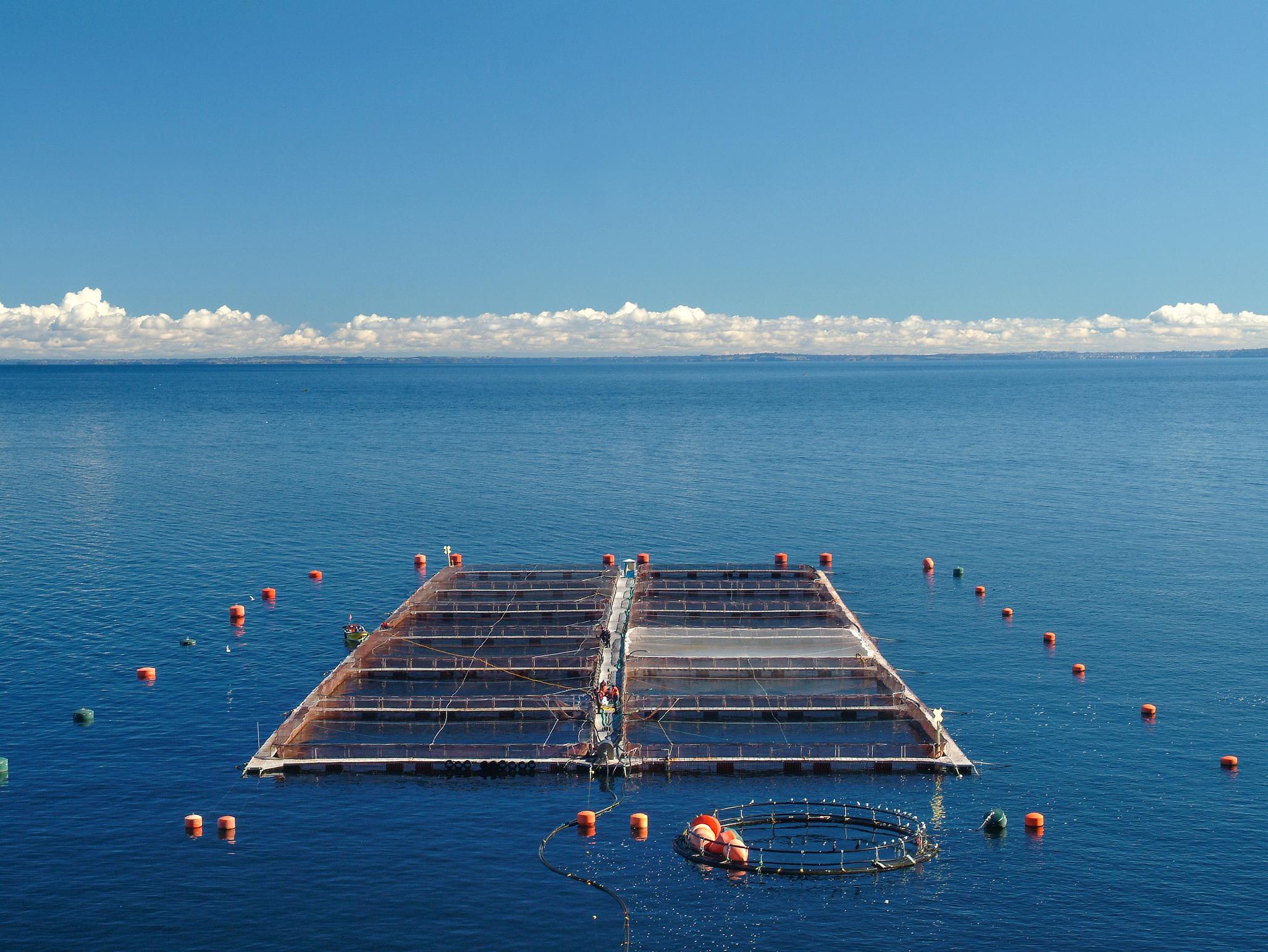
In last year’s Citizens of Seafood report, we announced our intention to conduct a greenhouse gas assessment in order to quantify Acme’s emissions and help determine which areas of impact to prioritize in our climate strategy.
Thanks to support from stakeholders across the company, we were able to accomplish this goal, measuring scopes 1 and 2 for our U.S. facilities in Brooklyn, Massachusetts, and North Carolina, as well as a complete assessment of our operations in Chile.
Some examples of how we’re putting this data into action is in North Carolina, where we are exploring opportunities to reduce our scope 2 emissions by sourcing renewable energy, and in Brooklyn, where we are investing in upgraded maintenance to our refrigeration.
In 2023 we will complete a global GHG baseline to review our 2022 operations that includes scope 1,2, and 3 emissions data for all factories in the U.S. and Chile, as well as our Danish plant, Norlax.
This Greenhouse Gas (GHG) Analysis represents the operational emissions measured across Acme’s Brooklyn, NY, Wilmington, NC, and Brockton, MA facilities using data from 2021. It covers scopes 1 and 2. A separate analysis was conducted of our Acme Chile facility which will be included in our Citizens of Seafood 2023 report.
Scope Definitions
Scope 1: Facility operations, company vehicles
Scope 2: Electricity purchased
Scope 3: Supplier emissions, air freight, packaging waste, employee travel
scope 3
scope 2
scope 1
2,099 electricity purchased
Wilmington, NC
2,099 tonnes CO2e
Acme’s largest single source of emissions
800 refrigeration
Total emissions in 2021: 5,383 tCO2e
801 electricity generated
Brooklyn, NY
800 tonnes CO2e
• 525 lbs of R507
• 50lbs of R438
• 120 lbs of R404
scope 1 electricity
scope 1 heat
scope 1 transporting goods: road
scope 1 refrigeration
scope 2 electricity
Brooklyn, NY
Diesel usage for the backup generator makes up to 801.4 tonnes CO2e

In last year’s Citizens of Seafood report, we announced that a greenhouse gas assessment would be conducted in 2022 as a way to quantify our emissions and help us to determine which areas of impact to prioritize. This work was completed by Climate Smart, a subsidiary of Radicle.
We are pleased to report this year that Acme Smoked Fish Co. is now a Radicle Climate Smart certified business. This means that the company has completed our greenhouse gas assessment and we have a draft plan for emission reductions.

It also means that we have joined a growing network of 1,200+ businesses and organizations, both in Canada and the U.S., who are sustainability leaders in their respective industries. To date, Radicle Climate Smart certified businesses have achieved an average of 24% emissions reductions against baseline, and $3.49 million in total cost savings.
Thank you to everyone who contributed to making this possible across finance, engineering, distribution, and other areas of Acme.
I’VE WORKED WITH ALL OF THE ACME FACILITIES
in North America over the years and they vary in age, functionality, and which products we produce. I would definitely say New York is the most challenging because it’s the oldest. We are always thinking about maintaining our refrigeration equipment in order to operate more efficiently and reduce our carbon footprint.
When we talk about carbon footprint, it’s not only refrigeration that we’re focused on. We have made some equipment updates as it pertains to the buildings themselves that will no doubt help bring numbers down. One example is improving the perimeter seal in order to better insulate the buildings and drop the total electricity usage across all the facilities. We have made some significant improvements in New York specifically and have seen some changes with ice buildup in the refrigerated spaces which makes me confident in our improvements. I believe the next steps would be to recalculate our electricity usage, and incorporate them into a new GHG assessment.
Natural gas also has a carbon footprint. When we factored
that into the analysis of our North American plants, we realized the usage really depends on the facility. With facilities like New York and Florida that rely heavily on natural gas for our smoking needs, it’s very difficult to avoid or reduce using natural gas.
We’re currently looking into some very interesting solar projects in North Carolina and Florida, trying to get a better layout of where and how we can install some photovoltaic panels and transition some of our energy needs to renewables.. But as with any major project of this size, there’s significant ROI considerations and calculations.
The past year was very educational. We spent a lot of time putting together the information across the three U.S. facilities to get a baseline for our overall impact. And I think we have a really good starting point. I really want to find out at the end of 2023 what reduction numbers we can put together for New York in particular. I understand the scope of work to get to those numbers and I’m hoping it’s a 15 or 20% reduction, but can we actually get there? It’ll be an exciting year ahead. •
 SIDDHARTHA SHAFIN AFTER INSPECTING EQUIPMENT ON THE ROOF OF THE BROOKLYN HQ
SIDDHARTHA SHAFIN AFTER INSPECTING EQUIPMENT ON THE ROOF OF THE BROOKLYN HQ
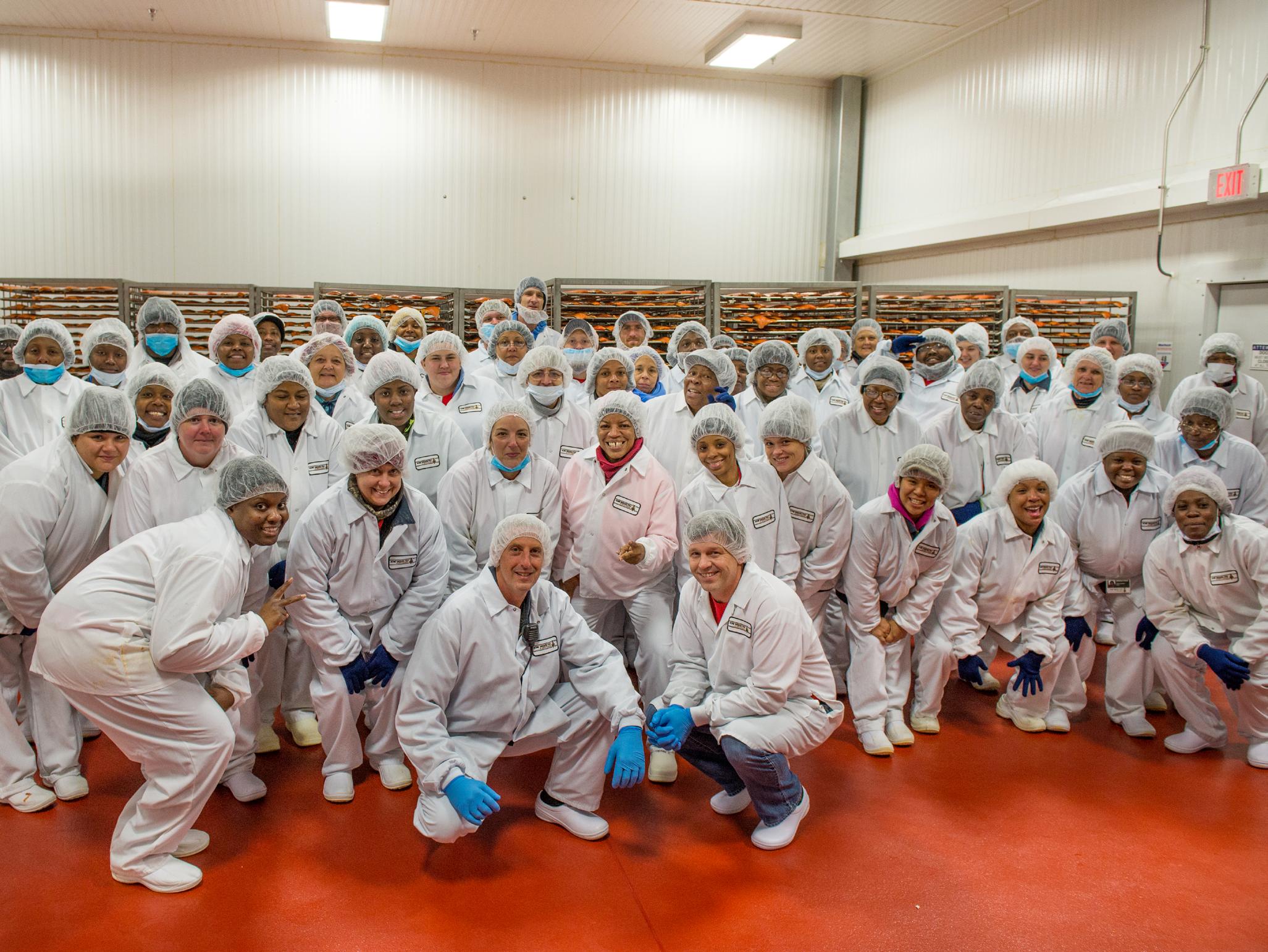 MEMBERS OF THE ACME TEAM IN WILMINGTON, NC
MEMBERS OF THE ACME TEAM IN WILMINGTON, NC
In 2022, the Acme Smoked Fish (ASF) Foundation launched two major initiatives: Education Scholarships and the Seafood Industry Climate Awards.
Through the Education Scholarships program, twelve individual grants were distributed to family members of Acme employees in the U.S. to pursue or continue their education. We prioritized scholarships to go to immigrant families or where the child or spouse would be the first to attend college.
In Chile, we worked with a community school near our production plant to build a soccer field and playground (made from recycled fishing gear!). The total amount distributed through these education programs was $50,000.
2022 was also the inaugural year for the Seafood Industry Climate Awards (SICA). Three awardees from the U.S. and two from Chile were chosen from a robust pool of applicants, and Acme reconfirmed our commitment to run the awards again in 2023. Read more about the Climate Awards in the next section.
The Acme Smoked Fish Foundation is grateful to partner with TD Bank for a second year to further our shared commitment to support a more sustainable seafood industry through the Climate Innovation Awards.
“At TD, we are committed to helping create a more vibrant planet by supporting the transition to a low-carbon economy and improving green spaces to reduce the impact of climate change. We are proud to continue to support the Acme Smoked Fish Foundation launch the Climate Innovation Awards to help to identify and celebrate individuals and organizations that are innovating to lower the carbon footprint of the seafood industry.”
AMANDA BATTEN FOSTER VIBRANT PLANET RELATIONSHIP MANAGER OFFICE OF CHARITABLE AND COMMUNITY GIVING, TD BANK
The Acme Smoked Fish Foundation believes that education is a gateway to success. Throughout our company’s history we’ve seen the power of education to transform the lives of individuals, their families, and their communities. At the same time we’ve seen the financial burden of education keep many from improving their lives and the lives of those around them. We aim to play a role in challenging this trend.
The Education Fund supports the families of U.S. based Acme employees by providing annual scholarships, ranging from $500-$1,000, to pursue educational goals after high school or successful completion of a GED. We aspire to make educational dreams a reality from four year degrees to technical certifications to trade schools and improve the communities where Acme employees live and work.
To learn more, click here.
The seafood industry has spent the past three decades addressing sustainability through research, certifications, improvement projects and more. While incredible progress has been made, the industry’s relationship to climate change is a relatively new question with limited, although growing, attention and resources.
And time is of the essence. Climate related impacts are already disrupting the industry, potentially leading to the collapse of fisheries, economies, and viability of the sector.
At Acme, we believe that when innovators—researchers, product developers, and entrepreneurs—have increased access to resources, they can help turn the tide to lead the seafood industry in the climate movement.
In September 2022, Acme Smoked Fish Foundation announced the first grant recipients of the Seafood Industry Climate Awards. Each recipient received between $10,000 and $40,000 to support a proposed innovation focused on lowering the carbon footprint within the seafood industry.
In partnership with TD Bank, Acme’s awards program looks to support innovation that will mitigate the impacts of climate change while featuring the work of underrepresented groups. In addition to funding, award recipients have opportunities to work with leaders at Acme Smoked Fish Corp to further their initiatives.
Read to learn more about the inaugural award winners from the U.S. and Chile.


This SICA award shows the steps the industry can take to adopt solar power energy while developing RAS technology, all while supporting Mi’kmaq food security.
Micmac Farms and Fish Hatchery, run by the Mi’kmaq Nation, currently provides approximately 12,000 pounds of Maine strain Eastern Brook Trout to the community each year, utilizing Recirculating Aquaculture System (RAS) technology. With this funding, the hatchery will now be able to couple renewable solar power with the existing RAS system, which will be a more viable and environmentally friendly practice. By creating an energy-independent aquaculture system, this project can buffer the disruptions to their food system brought on by climate change and other events. Additionally, the Micmac nation hopes that their work will inspire other native American communities working on similar efforts.
alfa
boat energy transition accelerator
Fuel usage in wild capture fisheries contribute significantly to carbon emission and high costs in the seafood industry. The ALFA BETA SICA Award takes on this challenge, piloting technology that would lead the way for the electrification of the SE Alaska Troll and Long Line Fleet.
ALFA is launching a pilot to convert the Alaska fishing fleet to hybrid diesel/electric as the next best step toward decarbonization. They are working with over 300
fisher-members throughout Alaska, the National Renewable Energy Laboratory, and the Energy Transitions Initiative Project Partnership to transfer technologies proven through other forms of transportation, including boats such as ferries and tugboats. The initial pilot will work with two vessels in the fall/winter 2022/2023 to convert to hybrid diesel/electric, track data, and engage the community. The SICA award will be used to purchase equipment for hybridization/decarbonization.

The lobster industry faces many challenges; among them the rising cost of fuel, the related carbon footprint, as well as the lack of diversity. These challenges are representative of fisheries more broadly in the US, and this program is taking on these challenges and showing a path forward that is inclusive and climate positive.
The Lift All Boats Initiative is a student lobstering program that provides access to BIPOC students, mostly immigrants, who typically lack a pathway to become a commercial fisherman in Maine. During the program students learn about the carbon footprint of the fishery and innovations that can reduce emissions from the lobster industry over time. The program just finished its first year and is expanding while also looking for opportunities to replicate the model. The SICA award will help fund the cost of instructors who can join the team on the water as they teach students the ins and outs of piloting a boat, baiting and setting traps, hauling traps, selling lobster, and more in a sustainable manner.
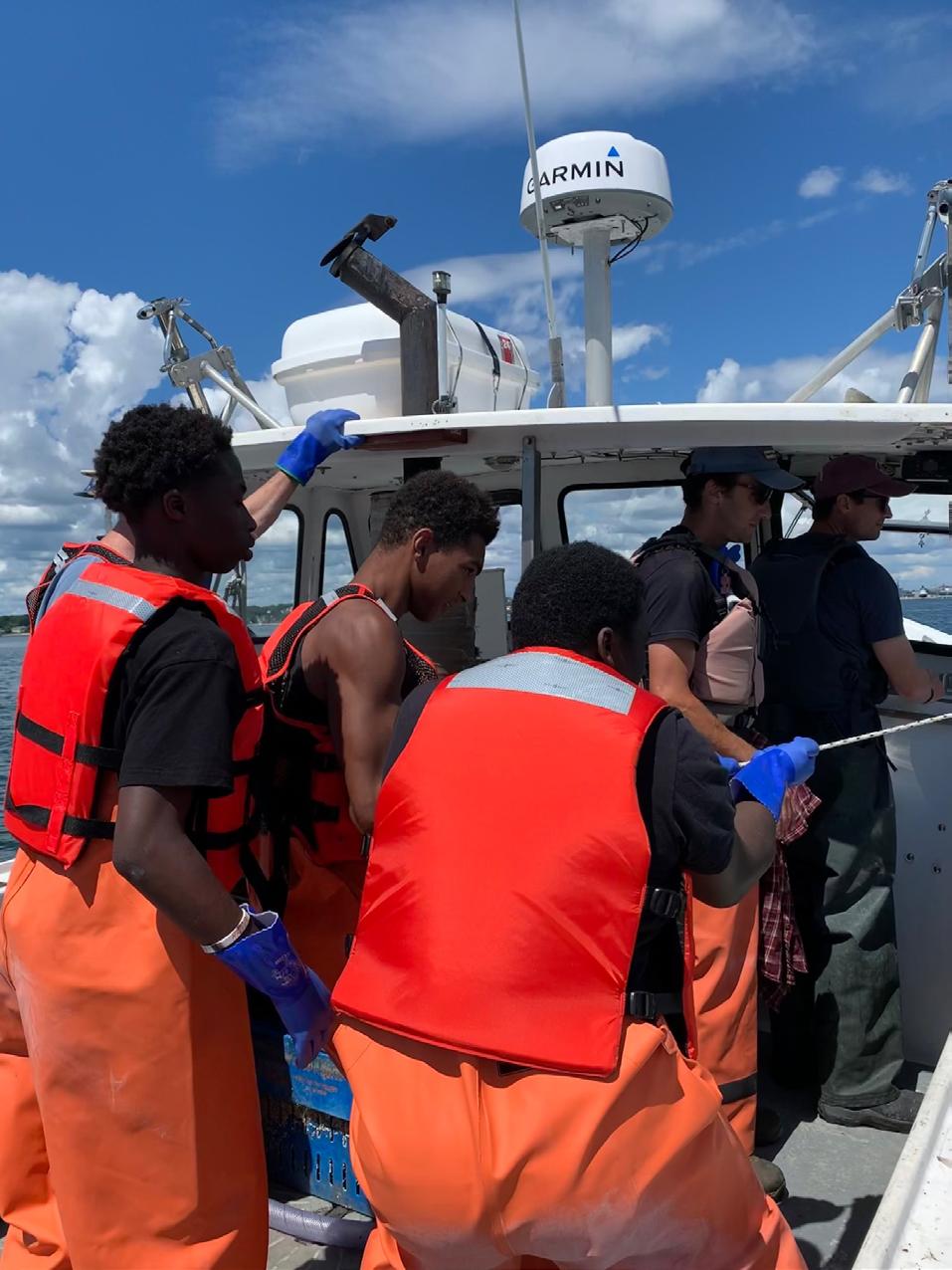
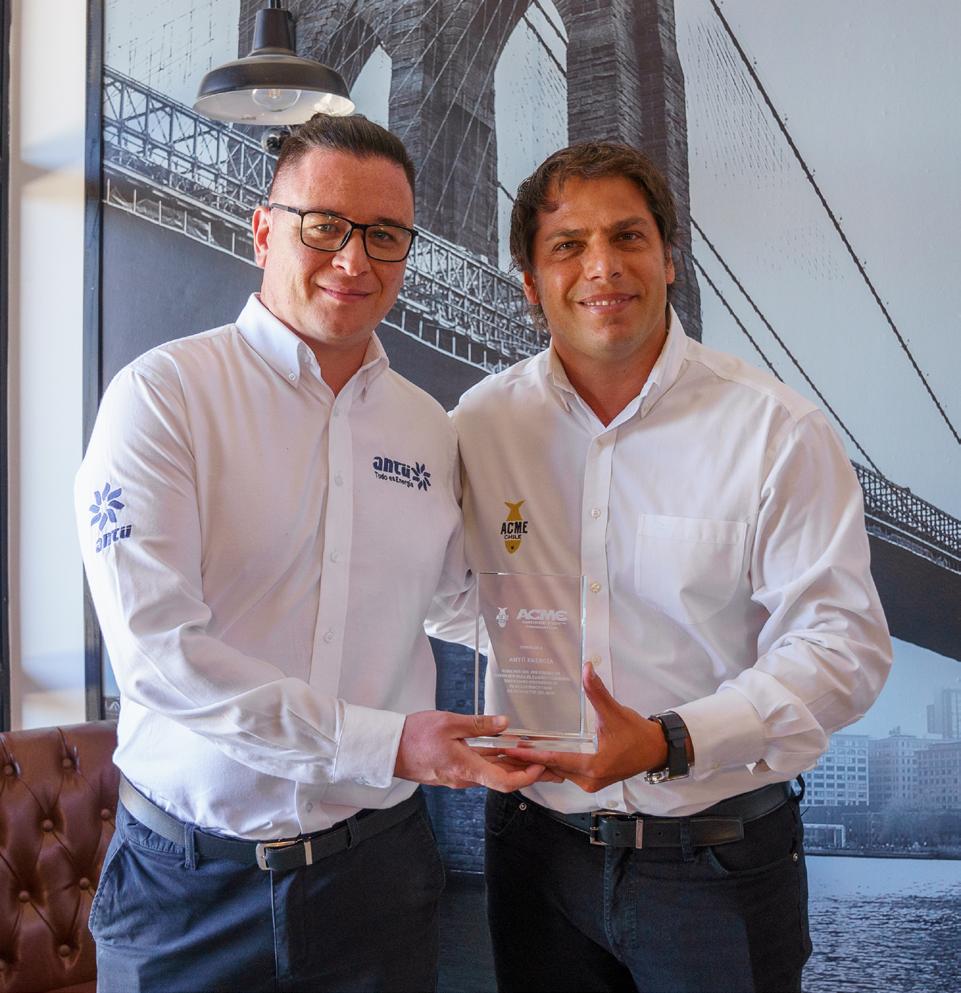
Reducing fuel consumption is also a priority for the seafood industry in Chile, contributing to cost savings and improved ecosystem health.
Antü Energía is a Chilean startup building zero emissions energy generation and storage systems. This SICA award, totalling $30,000, goes towards funding a pilot project to research and implement electric propulsion systems on small vessels currently operating with outboard combustion engines. These vessels, used to transfer personnel as well as execute operational tasks on salmon farms, are integral to salmon production in Chile. Antü Energía aims to reduce the greenhouse gas emissions associated with operating these small vessels, thereby improving the environmental footprint of the seafood industry at large.
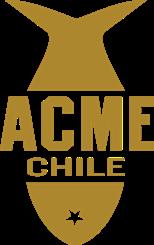
Plastic waste from salmon farming—from net pens to transportation bins and manufacturing equipment— is getting new life as recycled ecofuel.
Salmonhealth SpA is a startup with the purpose of offering innovative, efficient and sustainable technologies and solutions for salmon farming, the shipping sector and the energy and recycling industries in Chile. This SICA award, totalling $10,000, seeks to transform the plastic waste generated by the salmon industry into clean and efficient energy. This project will help reduce the carbon footprint of companies across the seafood sector, divert plastic waste from landfill through upcycling, and protect the biodiversity in the Los Lagos Region of Chile by minimizing the presence of microplastics. The project aims to remove 22,000 tons of plastic waste from the seafood industry in 3 years and transform it into usable energy.

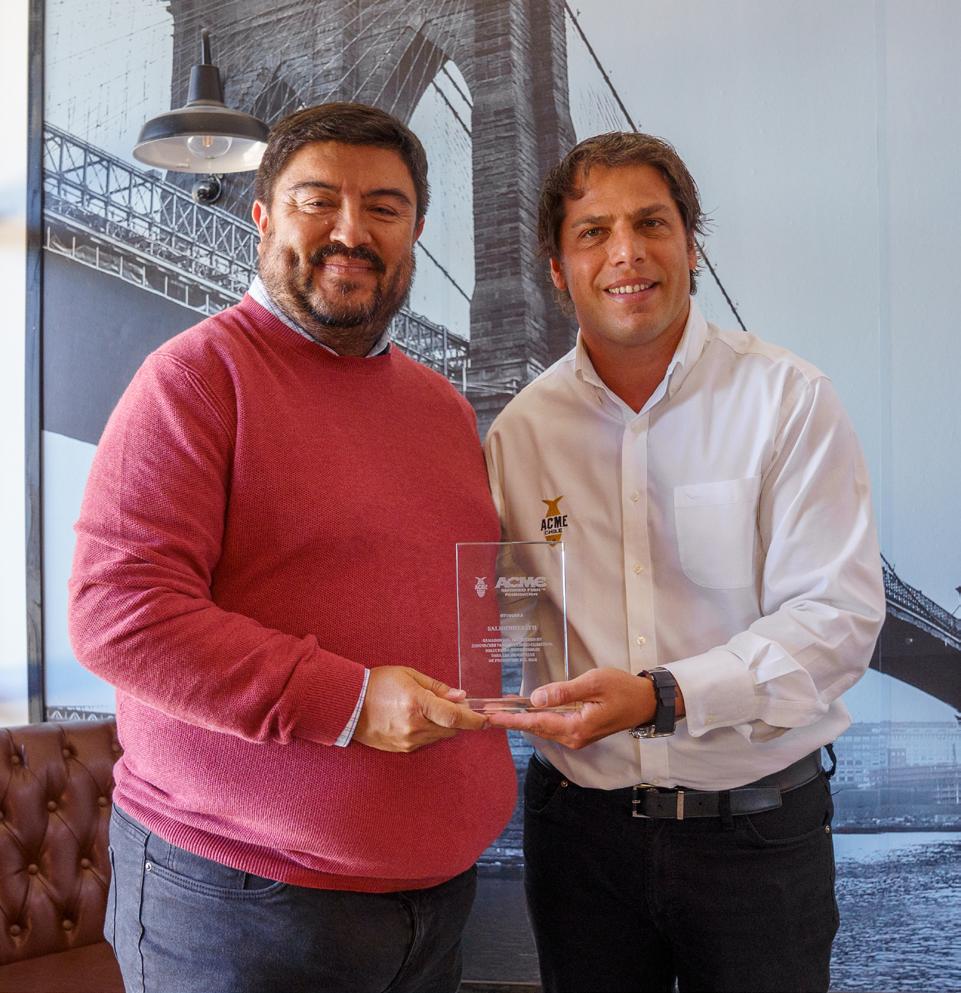
SPENDING SEVERAL DECADES in the seafood world was something of an accident for Jean McClain. Her sister was working at Seamark, a seafood company in Boston, and she got Jean a job there doing data entry while in college. Once she graduated, Jean became their credit and collections manager, and it was only a matter of time before she was taking on jobs at different seafood companies. Through the connections that she was making, she eventually met Alan Spence, a longtime salmon smoker and fishing boat captain from Scotland who arrived in Massachusetts in the late 1980s, anxious to start a Scottish-style smoked fish operation. He needed somebody part-time and Jean took it on.

“It was very humble beginnings, very small,” Jean said. “I think I was the third employee. He didn’t even have a bank account. I was like, where the heck is your bank account?”
As crazy as it was getting a new business off the ground, she and Alan made a good team and as the company evolved, Jean evolved with it. They ran Spence Co. Ltd. “lean and mean,” everyone wearing plenty of hats. In Jean’s role alone, she was purchasing fish, dealing with the bank, and handling most of the sales. In a few years time, she went from being the office manager to vice president of the company. It was fairly uncommon for women to hold leadership positions in the seafood industry at the time, but Jean sees it as a testament to Alan Spence’s vision and commitment to his people. “He was a great mentor and friend and I’m grateful for all the opportunities that I was given,” Jean said. “And I hope I emulate the same sense of care to everyone on my team.”
Acme acquired Spence & Co. in 2019, with Jean at the helm as General Manager. After a memorable 30 year career, Jean will be retiring from Acme in 2023. She looks forward to joining her husband who retired from a job in construction a few years ago and spending more time with her four grandchildren and her mother, who recently turned 100. It’ll allow Jean and her family to use their condo in New Hampshire more to go skiing and relax. She’s excited about this next chapter, but she’s nervous too. The decision hasn’t come easily for her. Spence and its people have been a huge part of her life. But she’s
confident that they’re in good hands with the support Acme has in place for them.
“I would never want to leave feeling that the folks here didn’t have the resources they needed,” Jean said. “But Acme’s been fantastic with the way they reach out and the tools and knowledge they offer. I couldn’t ask for anything better, I really couldn’t.”
And even though she won’t be working with smoked salmon every day, she’ll definitely miss it.
“Strangely enough, I wasn’t a huge fan in the early days,” she laughed. “It’s not what I grew up with. But I’ve evolved into a seafood snob. I guess that’s what happens when you’re around the best all the time.” •
“Acme’s been fantastic with the way they reach out and the tools and knowledge they offer.
I couldn’t ask for anything better.”
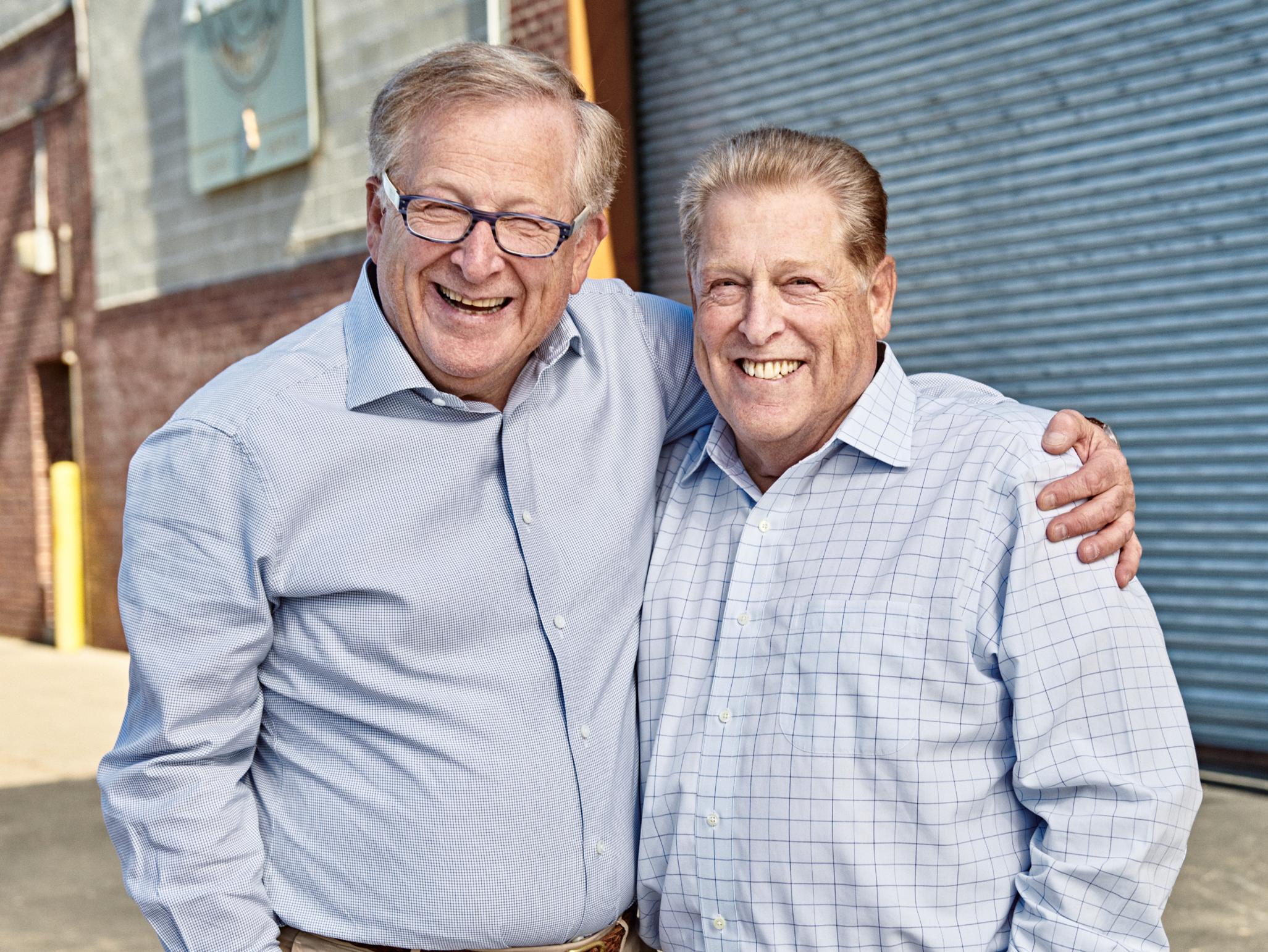 ROBERT (LEFT) AND ERIC CASLOW IN 2019
ROBERT (LEFT) AND ERIC CASLOW IN 2019
Through my high school years, I helped out at Acme during the summers. It was a seven-day-a-week business, and my dad and my uncles alternated who would open up on Sunday. When it was my dad’s turn, I volunteered. You know, big shot seventeen-year-old kid, I’d get to open up. I’d tell my friends, “I got to go home guys. I’ve got to go to work at four a.m.” I’d go into the factory at four a.m. on Sunday, and we’d make a few orders. There weren’t answering machines in those days. You called the customers, got the orders, made up the orders, split them up, everybody took some in their cars, and delivered on Sunday morning. It was something I felt proud of doing.
I’m going to go back to the time when my grandfather— Harry Brownstein, who started this business—was still alive. So that was the early 1960s. I used to follow him down to the Fulton Fish Market. We’d go from stall to stall and it seemed to me that he knew everybody. I didn’t know if he was visiting or buying fish or what, but it seemed that at every stall he stopped into there was a little whiskey to be had early in the morning. I think that that was my first indoctrination into the business.
I wanted to go right to work at Acme out of high school but there was something called the Vietnam War going on and my mother said to me, “You’re going to get drafted if you don’t get your deferment by going to college.” I didn’t really want to go to college, but I didn’t want to go to war either. I went to Bryant College, a business school in Providence, Rhode Island and got a decent education there. I came out with a degree in management in 1970 and started full-time at Acme. I graduated college on a Friday and on Monday I was here working. I was very anxious to come to work.

It was my dad and my uncle who were running the place at this point. But I didn’t really work for my dad. He had a general manager at the time named Walter and I worked under him. I did whatever they asked me to do from driving a truck to packing herring, making orders, delivering, whatever needed to be done. My brother joined us a couple of years later, and he was in the production side. I was in sales, marketing and distribution. Back then, there was still a lot of competition. There was Marshall’s Smoked Fish, Montrose, Nova Scotia. And that was just in this section of Brooklyn. There were other companies in other sections of Brooklyn, and in Philadelphia, Baltimore, Cleveland. There were just companies all over the place making smoked fish. How did we survive? We put our noses to the ground.

Eric and I had a great career together. We were working 60 to 70 hour weeks. You got there early, you had to be there. It was important that a family member was here when the plant was open. That’s the way we were brought up. We were good workers, we were fair managers. Unfortunately at that time, we didn’t have a lot of middle management. So Eric and I made all of the decisions on everything including what kind of coffee to order. We didn’t go as far deciding on what paperclips to get, but the coffee, yes. We weren’t the smartest guys on the block, but we were there every day. We kept plodding away, coming to work and trying to do the best job. That’s who we were.
Can you think of moments over your career that stand out, any event that is particularly notable to you?
I remember the first time we ever did a hundred thousand in sales for the week. I came running home to my wife and said, “Can you believe we did a hundred thousand in sales? It’s unbelievable.” I think it was my first year working and we did somewhere between three and four million for the year. I thought that was huge. Then we kept plodding along. But more importantly, it was when the fourth generation decided to come to work here. The first one was my nephew, David. I wasn’t blindsided, but I didn’t know that any of the children—I call them children—wanted to come into this business. I was really, really happy that there was someone else. I thought that my brother and I would die here with our boots on and somebody would push us aside and do something else here. By the time Adam came in, Eric and I had an unwritten rule that David worked with me and Adam worked with my brother. We just thought it was better not to work with your dad. And when Emily was in college, she would call me every day and ask, “How were the sales?” I knew that she was interested, but I wasn’t sure if she was going to want to come into this. I looked at it as a dirty, smelly, smoky business. I mean, it was a family business, but you had to really work at it. It was no gift. It wasn’t just staying home and getting a check. No, you really had to work at it.
The fact that the next generation was interested, and wanted to work here, and wanted to try it, was a big highlight of my life.
My involvement at this point is more to be here as an elder statesman. I’m here for moral support, to be a cheerleader. I remember sitting with my brother after meetings, after everyone left, and I’d say to him, “You know, they want us here. They don’t necessarily want our input.” We needed to strike a balance between what we thought was really important to say to them as opposed to telling them what to do, because they need to figure it out themselves. That’s something that I was very proud of, that between the both of us we were able to step back and turn the control over to the next generation.
I don’t remember a line in the sand that said, “Okay, from now on, you’re in charge.” It was just very smooth and seamless. I use the word cheerleader or chairman or mentor because I don’t want to step too far back and not come here anymore. I want to continue to be here for them when they want to tell me some of their issues or bounce ideas off me. I want to be able to give them whatever good insight I can.
This being a multi-generational business, what does the family element mean to you?
Family’s always been an integral part of our business. I’m very proud that this was a family-run business and it’s still owned by the family, but we have so many talented people here. It gives me great pride to see the talent that we have here to help run this business. You can’t run this business with just a few brothers or cousins or whatever. It started as a family business and it’s important to me that it remains a family business, but without the terrific staff we have, I don’t know if we’d be able to do that. Family businesses usually don’t last into the fourth generation, let alone the fifth generation knocking at the door. We’ll see. We’ll see what happens.
How have you seen the focus on sustainability evolve, especially as it’s transitioned into the fourth generation and beyond?
I think the way we looked at sustainability in the past is, “Will we be here next week and next month and next year to support all the families that work for us?” But now we have Rob Snyder on board and he’s enlightened us on sustainability, culture, and the philanthropic nature of the company giving back. For a long time, Acme was focused
on viability, staying alive financially as a business. So we’ve been slow to start doing these things. But now we’re large enough to take them on. The desire has been there, but you need someone to focus you and get you started and keep pushing, because it needs to continue. It’s a way of life. I hope everyone continues to be conscious about our planet. Not just seafood, you know, everything.
I’m thinking of my dad. If you asked my dad what his aspirations for the company were, he’d say, “Nowhere to go but up!” That was his expression. And it’s true. We’re doing terrific and climbing. So what are my aspirations for this company? Not just to grow, but to grow with a purpose to be responsible citizens of seafood. I really think that’s an important part of our family heritage. You reflect back and you see, when Eric and I were here, that there were about 150 people working. And now I’m told there’s over a thousand people working for this company and we’re responsible for supporting these people and their families. So that’s sustainability to these families and to the seafood business as well. I hope that this generation and the next generation to come continues that desire and has the fire in the belly to continue this kind of work. •
 ADAM, EMILY, AND ROBERT CASLOW IN FRONT OF THE BROOKLYN HQ FACILITY
ADAM, EMILY, AND ROBERT CASLOW IN FRONT OF THE BROOKLYN HQ FACILITY
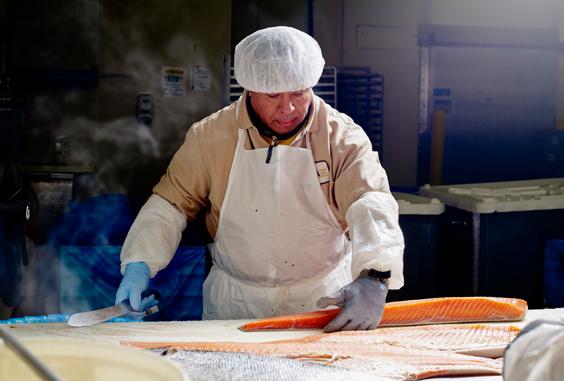
We’re proud to uphold our long legacy of making connections personal and interactions meaningful for our coworkers, teams, customers, partners, and communities.

We hold ourselves accountable to exceed expectations and deliver the highest quality outcome across everything we do.
We believe in getting a little better every day, quickly learning from our experiences, and acting on opportunities to grow.
We’re obsessed with bringing passion to the table, celebrating our traditions, and inspiring each other to innovate.
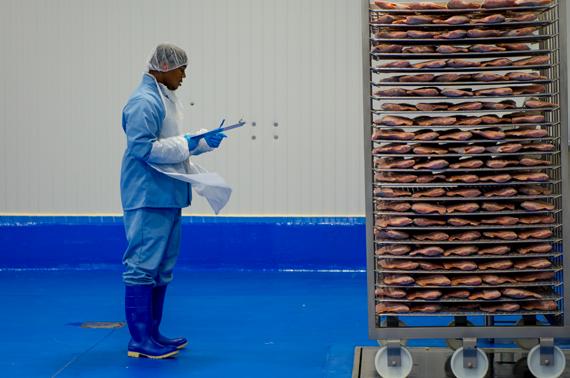
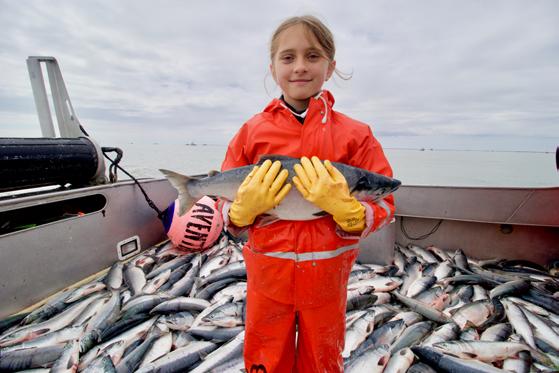
We strive to do right by our people, our communities, and our planet by putting social responsibility and sustainability at the center of our decisions.
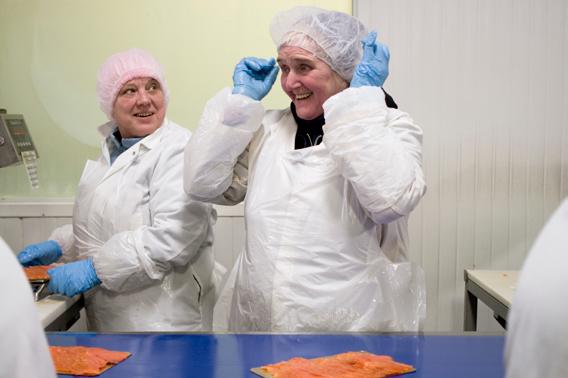
98%
Acme is proud that 98% of all the salmon that we source is certified under one of several eco-certifications recognized in the GSSI benchmark.
The Best Aquaculture Practices certification system ensures that aquaculture practices are followed using standards that are socially and environmentally responsible. The program combines site inspections and ample sampling with sanitary controls, therapeutic controls, and traceability. Acme is committed to working with salmon suppliers that adhere to BAP standards.

The Aquaculture Stewardship Council is an independent non-profit organization and labeling organization that establishes protocol on farmed seafood while ensuring sustainable aquaculture. The ASC provides sustainable and responsible aquaculture producers with a stringent certification and labeling scheme guaranteeing to consumers that the seafood they are purchasing is sustainable for the environment, and socially responsible.
The Marine Stewardship Council is a certification organization that works with fisheries, seafood companies, scientists, and conservation groups around the world to promote best environmental practices. Many of Acme’s wild caught seafood is MSC certified.
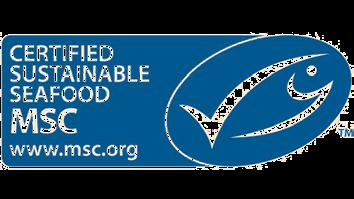
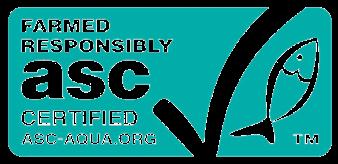
GLOBALG.A.P. is a brand of smart farm assurance solutions developed by FoodPLUS GmbH in Cologne, Germany, with cooperation from producers, retailers, and other stakeholders from across the food industry. These solutions include a range of standards for safe, socially and environmentally responsible farming practices. Acme uses the GLOBALG.A.P. Integrated Farm Assurance (IFA) standard in its application to salmon aquaculture.

Seafood Watch is a sustainable seafood advisory list, and has influenced similar programs globally. It is best known for developing science-based seafood recommendations that consumers, chefs, and business professionals use to inform their seafood purchasing decisions. Seafood Watch standards for aquaculture, fisheries, and salmon-specific fisheries undergo regular review and revision to ensure the latest science and best management practices are incorporated.

EU ORGANIC: European Union regulations on organic farming are designed to provide a clear structure for the production of organic goods across the whole of the EU. This is to satisfy consumer demand for trustworthy organic products while providing a fair marketplace for producers, distributors and marketers. The organic logo gives a coherent visual identity to EU produced organic products sold in the EU. This makes it easier for EU based consumers to identify organic products and helps farmers to market them across all EU countries.

Organic Denmark is an association of Danish companies, farmers, professional kitchens and consumers making them the largest representative of the organic food industry in Denmark. They have successfully brought together the entire organic sector in Denmark comprising 200 companies in a coordinated marketing strategy and are instrumental in helping smaller companies to work professionally with retail.

BRCGS is an international certification body for food safety and meets the requirements of the Global Food Safety Initiative. Widely regarded as the benchmark for best practices in the food industry, BRCGS certification demonstrates adherence to high standards of quality and safety in food processing.
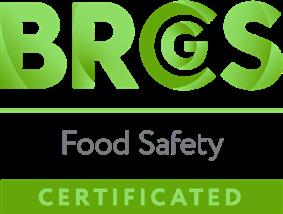
KOF-K is a globally recognized kosher food certification organization that requires its certified producers to meet the rigorous standards of kosher food preparation. Only products and services meeting these stringent standards are permitted to display the KOF-K symbol.

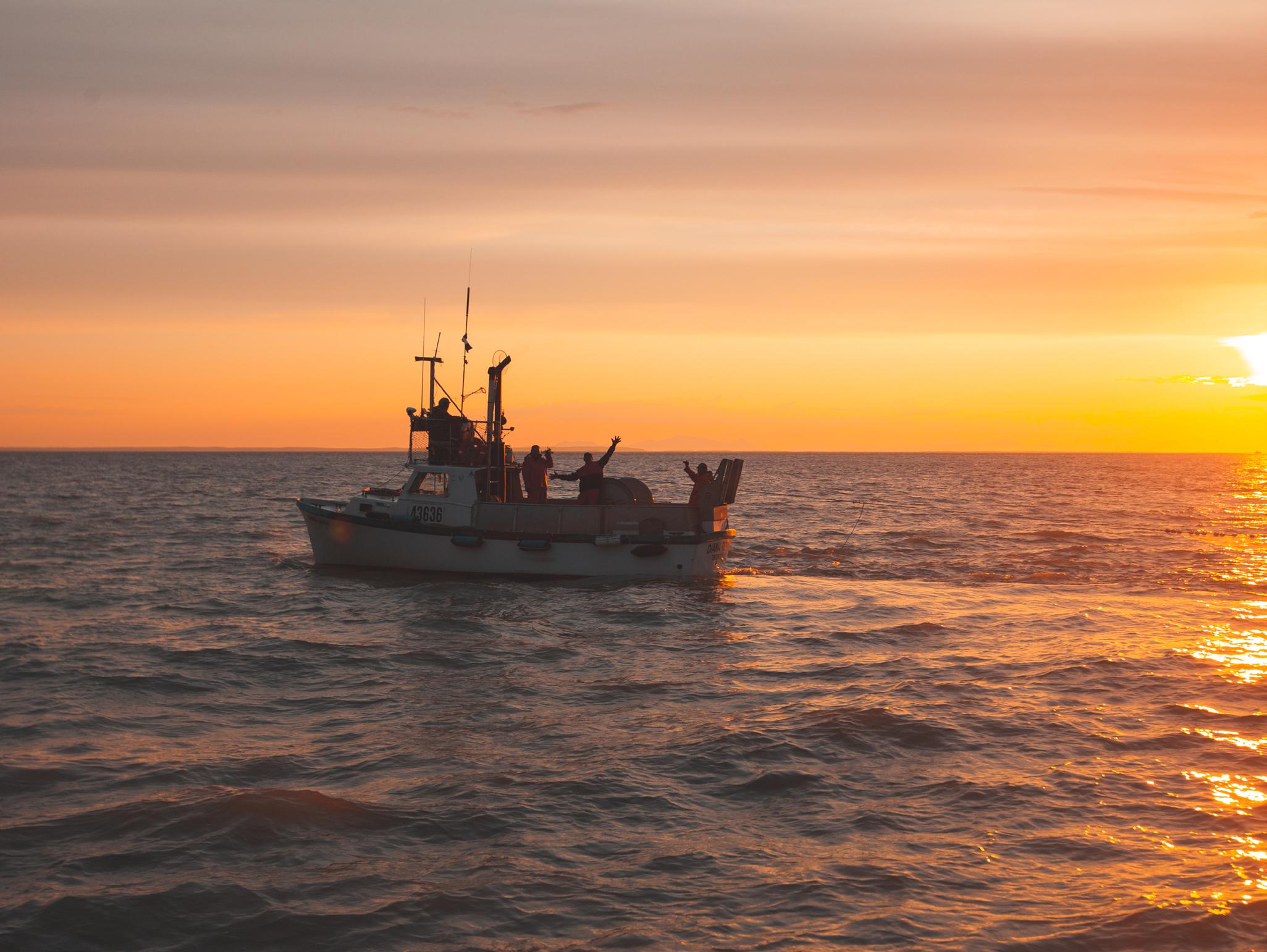

Thank you to all Acme Smoked Fish Co. team members who are working on sustainability.
EDITOR Rob
SnyderPRODUCER Scott Sell
PROJECT MANAGER
Andrew Larsen
ADDITIONAL EDITING Alex Golub DESIGNER
Maeve O’Regan
We would also like to thank our partners at Bristol Bay Regional Development Association for contributing photography to the report.
